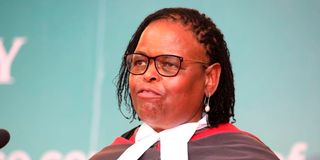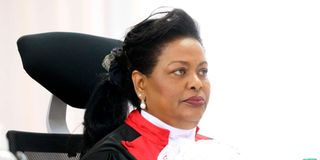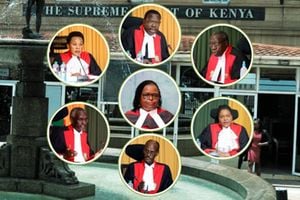
Chief Justice Martha Koome.
Five Supreme Court Judges have launched a fresh last-minute fight for survival against the Judicial Service Commission (JSC) over a proposal to remove them from office, with Chief Justice Martha Koome expressing fears that their files may be sent to President William Ruto next week.
In her court filings for an order stopping JSC from proceeding with the petitions, the CJ pointed to a possibility that two of the petitions could be forwarded to the President on Monday, February 24 for the constitution of a disciplinary tribunal to investigate her and the other six Supreme court judges.
The CJ together with her deputy Philomena Mwilu and Justices Mohamed Ibrahim, Njoki Ndung'u and Isaac Lenaola separately rushed to court on Friday seeking for an order to stop the JSC proceedings and stall any further move by the Commission.
Also Read: Justice Njoki Ndung'u sues the JSC
After hearing the pleadings of the CJ and Justice Njoki Ndung'u, who filed the cases early on Friday morning under a certificate of urgency, High Court Judge Lawrence Mugambi granted temporary orders barring JSC from further proceeding with the ouster petitions pending determination of the application filed by the judges.
Deputy Chief Justice Mwilu, Justice Ibrahim and Justice Leonala filed their court cases against JSC later in the day on Friday. The order issued by Justice Mugambi covers the entire seven-judge bench.
The Nation could not immediately confirm if Justices William Ouko and Dr Smokin Wanjala had also filed any case in court by the time of publishing this article.
The judges are fighting their removal from office as proposed by former Cabinet Secretary Raphael Tuju and lawyers Nelson Havi and Christopher Rosana.
The move to court came two days to the lapse of a 21-day deadline granted by JSC to respond to the ouster petitions.
The petitioners want JSC to recommend to the President to remove the entire seven-judge bench over alleged incompetence, misconduct and misbehaviour. JSC had on January 27, 2025 granted the judges 21 days to respond to the petitions.
The CJ told court that in absence of the conservatory order, the judges were facing imminent exit.
“Consequently, there is a very real and imminent risk that JSC will on Monday, February 24, 2025 or soon thereafter, forward both the Havi and Rosana petitions to His Excellency the President for constitution of a tribunal to determine the same,” said CJ Koome in a sworn affidavit, adding that suspension of the seven judges will effectively cripple functioning of the Supreme Court.
She explained that the suspension of the apex court ‘will have attendant consequences on other State organs and the people of Kenya’ and that allowing JSC to continue entertaining the petitions ‘would amount to mockery of justice’.
Through lawyer George Oraro, the Chief Justice stated that intervention of the High Court and stopping the JSC proceedings was necessary to ensure the functioning of the Supreme Court is not suspended.
“Should the CJ and the seven judges of the Supreme Court be subjected to the disciplinary process initiated by the JSC, the damage to be sustained would be irreversible and the petition court petition rendered pyrrhic for all intents and purposes, as the said judges will stand immediately suspended and thereafter subjected to an unlawful and unconstitutional process without any recourse to court,” said Mr Oraro.
The CJ’s fears come at a time the petitioners are fighting to reverse a temporary order issued by the High Court in Narok stopping the JSC proceedings.
Led by Mr Havi, the petitioners argue that removal of a judge from office is a Constitutional process which cannot be stopped.
They have borrowed their argument from the impeachment case of former Deputy President Rigathi Gachagua against the National Assembly where the High Court ruled that an ongoing Constitutional process cannot be stopped or interfered with.
According to Article 168 of the Constitution, should the JSC make a recommendation for formation of a tribunal, the President is expected to establish the tribunal within 14 days after receiving the petition and suspend the judges from office.
In the case of the Chief Justice, the Presidential tribunal is chaired by the Speaker of the National Assembly and the members include three superior court judges from common-law jurisdictions, one advocate of 15 years standing and two other persons with experience in public affairs.
For the other judges, the tribunal consists of a chairperson and three other members, one advocate of 15 years standing and two other persons with experience in public affairs.
CJ Koome together with DCJ Mwilu and Justice Njoki have also taken issue with the decision of the JSC to process the ouster petitions as they concern cases that are ongoing in different courts.
They said the petitions at JSC are sub-judice and that issues raised are subject of four ongoing cases at the High Court, Court of Appeal, Supreme Court and East African Court of Justice.
“The continuation of the proceedings before the JSC thus poses an imminent risk of irreparable harm and infringement of Justice Njoki’s nights and inflicting irreversible damage on her professional reputation and the integrity of the Judiciary. Specifically, the proceedings threaten to trigger automatic suspension and the formation of a Tribunal under Article 168(5) of the Constitution--amounting to an unlawful, ‘de facto’ removal from office and inflicting irreversible damage on the Petitioner's professional reputation and the integrity of the Judiciary,” said Justice Njoki.

Justice Njoki Ndung'u.
She describes the ongoing ouster process as “unconstitutional and unfounded disciplinary proceedings”.
Faulting JSC for admitting the petitions, her lawyer Andrew Musangi said the Commission’s actions are characterised by the lack of defined procedural safeguards and an overextension of its statutory authority.
He contended that ‘JSC is acting ultra vires by seeking to review and discipline a Supreme Court judge for decisions rendered in the course of judicial duty-actions that amount to an unconstitutional merit review, threatening judicial independence and subverting the constitutional safeguards designed to insulate the Judiciary from external interference.
The lawyer added that ‘allowing the unconstitutional proceedings before the JSC to proceed will continue to embolden vexatious litigants to misuse the JSC as a pseudo-appellate forum to challenge judicial decisions’.
“Allowing the process to proceed will also weaponize the JSC to threaten and undermine judicial independence and destabilize the judiciary and foster a climate of intimidation against judges,” he argued.
Justice Mwilu also filed a notice of preliminary objection at the JSC contesting the commission’s powers to entertain the petitions.

Philomena Mwilu is the Deputy Chief Justice and vice-president of the Supreme Court of Kenya since October 28, 2016.
“The Commission lacks the requisite jurisdiction to hear and determine the Complaint as drawn and filed on account of the express provisions of Article 168 of the Constitution which specifically only mandates the Commission to initiate the removal of a judge from office on the basis of the grounds set out in Article 168 (1) of the Constitution on account of individual and personal culpability and not on the basis of collegial decisions of the Supreme Court,” said the Deputy Chief Justice through Kemboy Law Advocates.
She said the petition by Mr Havi is fatally defective and bad in law and “even when taken at its highest, is an impish attack on the independence of the judiciary espoused and is otherwise an abuse of the Commission’s mandate”.







